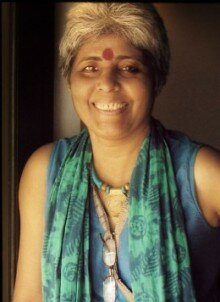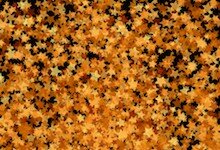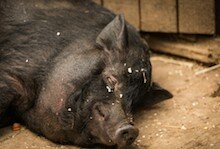
Teji Grover (born 1955) is a Hindi poet, painter, translator and environmental activist. She has published five collections of poetry, one novel and a collection of short stories. She has received the Bharat Bhushan Agrawal Award (1989) and the Raza Award for Poetry (2003). Her poems have been translated into a number of Indian and foreign languages, including Swedish and Polish. She has also translated several Scandinavian and Indian writers into Hindi, as well as several Hindi writers into English.
The first thing that strikes one about Grover’s poems is their strangeness. Perhaps even more distinctive is their serene sense of strangeness; their lack of anxiety at their own whimsical, throwaway quality; their refusal to yield to the tyranny of easy meaning; their unconcern about simplistic notions of gravitas and social conscience.
In an evocative essay entitled “Looking at the Body of a Poem” (included in this edition), Grover writes of her childhood fascination with verse: “The pleasure of the thing not understood was the first thing about poetry that I understood. I don’t know why but I never felt the urge to go to the meanings of incomprehensible words. The demand for meaning was something I never made from poetry.”
The same fascination with the strange seems to have drawn her, a native Punjabi speaker, to the language of Hindi. English, she says in the same essay, “had no cultural warmth in the context of my writing”. As for Punjabi, it was a language to which she was far too habituated; it had “no call of the unknown”; it had “warmth, no dearth of meanness either” but seemed “altogether lacking in enigma”; it was a language in which “I could be face-to-face with neither death nor lover”. And so it is Hindi she chose for its mysteriousness, its beckoning “delirium of sound”, its haunting refusal to allow for instant decodability.
The poems in this selection offer a glimpse of the poet’s fascination with that tugging insistent “call of the unknown”. There is also a pervasive sense of reverie or dream, a preoccupation with the evanescent moment, the sense of being on the verge of meaning, the cusp of discovery. “Someone will soon be here/ to shatter the make-believe”, the poet says in one poem. And in another, she distils the ache and rapture of a moment of ‘beforeness’, a moment before intimacy, before words, before death, a moment before even the word ‘before’ begins to have meaning.
Grover describes poetry as dance. The poet, she says, “forever considers herself a fluke. She is a dancing labourer, so is not burdened by work. Her burden is only of fearing that it won’t happen again.”
The excitement and elation at ‘fluking’ the dance is very much in evidence in these poems, in their featherlight touch, their unhurried savouring of the moment, their childlike sense of wonder at a world hovering in perennial suspension between reality and make-believe.
Selected bibliography
Poetry
Teji aur Rustam Ki Kavitaen, Harper Collins, New Delhi, 2009, (selected poems of Teji Grover and Rustam Singh), ISBN: 8172238797
Maitri , Surya Prakashan Mandir, Bikaner, 2008
Ant Ki Kucch Aur Kavitayen, Vani Prakashan, New Delhi, 2000
Lo Kaha Sanbari, National Publishing House, New Delhi, 1994, ISBN: 81-214-0537-8
Yahan Kucch Andheri Aur Tikhi Hai Nadi, Bharati Bhasha Prakashan, New Delhi, 1983
Prose
Sapne Mein Prem Ki Saat Kahanian, Vani Prakashan, New Delhi, 2009
Neela, Vani Prakashan, New Delhi, 1999, ISBN: 8170556686
As translator
Barf ki Kushro (translations of Swedish poetry with Lars Andersson), Vani Prakashan, New Delhi, 2001, ISBN 8170558271
Das Sankaleen Norweeji Kahanian (Ten Contemporary Norwegian Short Stories), Vani Prakashan, New Delhi, 2008, ISBN: 8181437330
Links
Pratilipi : Essays, reviews and translations by Teji Grover
Varnamala and Kritya : Translations of Teji Grover’s poems, ‘From An Insecure Poet to an Unknown Reader’ and ‘Thinking of Sakhis’







